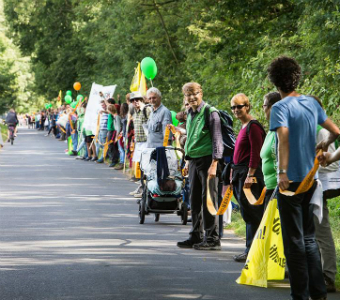This weekend, over 7.500 people came together to form a human chain between Poland and Germany, in opposition to the expansion of lignite mines in the border area. The action, which was organised by Greenpeace with help from other NGOs across Germany and Poland, was meant to show solidarity with villagers in the south-west of Poland and south-east of Germany whose homes and livelihoods are to be destroyed if plans to expand coal mines by PGE in Poland and Vattenfal in Germany are to go ahead.
, | 25 August 2014

This weekend, over 7.500 people came together to form a human chain between Poland and Germany, in opposition to the expansion of lignite mines in the border area. The action, which was organised by Greenpeace with help from other NGOs across Germany and Poland, was meant to show solidarity with villagers in the south-west of Poland and south-east of Germany whose homes and livelihoods are to be destroyed if plans to expand coal mines by PGE in Poland and Vattenfal in Germany are to go ahead.
The human chain, made up of locals, activists from big cities in Poland and Germany, as well as foreign friends, stretched between the village of Grabice in Poland to Kerkwitz in Germany.
Kuba Gogolewski, one of the Bankwatch campaigners who joined the action said:
“I came to take part in the human chain because it is very important for me that Poland develops like a normal, modern country. It’s also really not okay that someone just comes and kicks 3,000 people out of their homes.”
Participants stretched the chain over the Neisse river, which constitutes the border between Poland and Germany in that area, and after forming the chain, went on to celebrate with a concert at the former border control checkpoint which separated the countries before Schengen.
The Swedish energy corporation Vattenfall is planning expand lignite mining operations in the German part of the Lausitz region. This would mean that the region’s coal-fired power plants, which are among the dirtiest in Europe, would continue to burn climate-damaging brown coal, also known as lignite, until well beyond 2050.
Anike Peters, climate & energy campaigner at Greenpeace Germany commented:
“If Vattenfalls lignite plans will be realised, there’s no way Germany can achieve its own climate goal (to reduce CO2-emissions by 40% until 2020). Additional lignite mines are not necessary. They would not only be catastrophic for people, nature and climate – it would also be highly tragic, as beyond 2030, when existing coal mines will be exhausted, renewable energies will have made coal redundant.”
A disaster is unfolding on the Polish side too. The Polish state-owned company PGE is planning to exploit the region’s gigantic coal deposits and build a huge new coal-fired power plant. Poland is the country which over the past years has been the sternest opponent to progressive EU climate policies, not in the least because of its plans to continue to rely on coal for decades to come.
While the expansion of the mines is to take place some years in the future, strong opposition has emerged over the past years. Many of the locals on both sides of the border are determined not to lose their homes. They are also interested in preserving the cultural heritage of Lusatia, a region inhabited not only by Germans and Poles, but also by Sorbs, a Slavic minority for whom this region is a unique home.
See film footage and photos from the action published by Greenpeace.
Never miss an update
We expose the risks of international public finance and bring critical updates from the ground – straight to your inbox.
Theme: Energy & climate | Social & economic impacts
Location: Poland | Germany
Tags: coal | human chain | lignite | protest | resettlement
